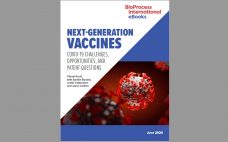Resolving the COVID-19 pandemic depends on treatments, testing, and ultimately a widely disseminated vaccine against SARS-CoV-2. In recent decades, the biopharmaceutical industry has developed new approaches to vaccination using antigens, virus-like particles (VLPs), viral and bacterial vectors, and nucleic acids. Current events have placed those innovations at the front and center of public attention, offering many companies an opportunity to demonstrate their potential in an unprecedented way. Here, BPI’s senior technical editor describes the challenges that developers face in doing…
Friday, May 22, 2020 Daily Archives
Cyclic Cell Harvest with CONTIBAC® SU Filters
As the Biotech industry is moving towards single-use components, larger batch volumes and higher cell concentrations, conventional cell harvest technologies reach their limit. Depth filters, for instance, can only cope with the increasing demands by stacking more filter elements and therefore increasing the footprint and their economic burden. Hence, innovative solutions are needed to keep pushing the boundaries of the biologics production. The CONTIBAC® SU filter of DrM excels where existing technologies crumble. Unlike in any competing technology, the filtration…
Continuous manufacturing back in second Act
House tries again to promote advanced technology for the return of pharmaceutical manufacturing to the US in post-COVID-19 era. The new HEROES Act legislation revives a proposal to establish national centers of excellence for continuous pharmaceutical manufacturing that had earlier made it into the US House of Representatives’ version of the CARES Act but not the final enacted CARES pandemic relief law. The HEROES bill (HR 6800) authorizes $100 million for the centers of excellence, available until expended. That’s up from the $80…
Prefab facilities could feed the need for COVID vaccine capacity, say Univercells and Exyte
Exyte and Univercells Technologies have teamed to develop and construct modular GMP vaccine manufacturing plants that can be deployed in a third of the time of conventional facilities. As vaccines against COVID-19, caused by the SARS-CoV-2 virus, begin to move through the clinic at an unprecedented speed, the question is rising as to how industry can scale-up production. At the heart of this is ensuring capacity is available to produce millions, if not billions, of doses of a potential vaccine.…
Cytiva to help Takara gear up for COVID-19 vaccine production
Cytiva will help Japan’s Takara Bio prepare manufacturing processes for a DNA-based SARS-CoV-2 vaccine candidate. Cytiva announced the collaboration this week, explaining it will work with Takara and partners Osaka University and AnGes to develop production processes and technology for the vaccine. Stephane Perrey, general manager for Cytiva in Japan, Australia, and New Zealand, told us “Cytiva is providing process design consultation, prioritization of equipment manufacturing and prioritization of consumables manufacturing. “We worked closely with Takara Bio to help them…





